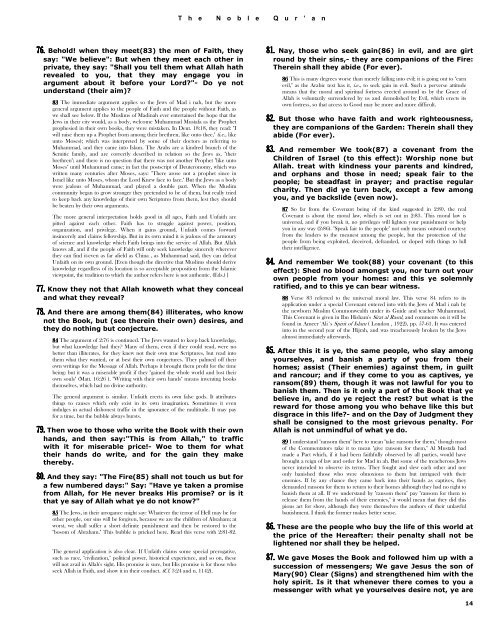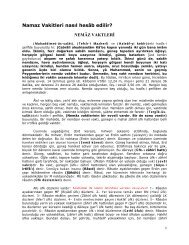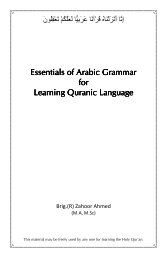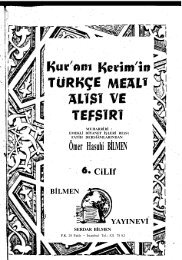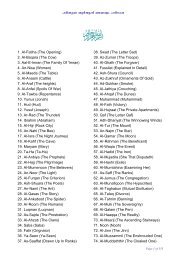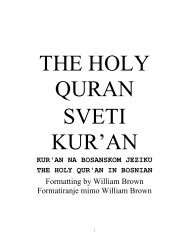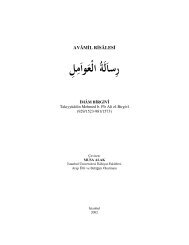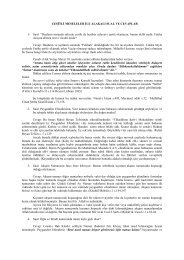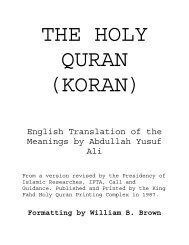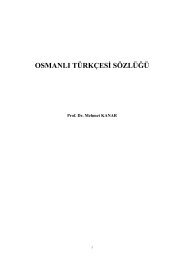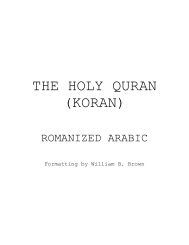English Quran with Commentaries By Yusuf-ali - HolyBooks.com
English Quran with Commentaries By Yusuf-ali - HolyBooks.com
English Quran with Commentaries By Yusuf-ali - HolyBooks.com
- No tags were found...
Create successful ePaper yourself
Turn your PDF publications into a flip-book with our unique Google optimized e-Paper software.
T h e N o b l e Q u r ’ a n<br />
76. Behold! when they meet(83) the men of Faith, they<br />
say: "We believe": But when they meet each other in<br />
private, they say: "Shall you tell them what Allah hath<br />
revealed to you, that they may engage you in<br />
argument about it before your Lord?"- Do ye not<br />
understand (their aim)?<br />
83 The immediate argument applies so the Jews of Mad i nah, but the more<br />
general argument applies to the people of Faith and the people <strong>with</strong>out Faith, as<br />
we shall see below. If the Muslims of Madinah ever entertained the hope that the<br />
Jews in their city would, as a body, wel<strong>com</strong>e Muhammad Mustafa as the Prophet<br />
prophesied in their own books, they were mistaken. In Deut. 18:18, they read: "I<br />
will raise them up a Prophet from among their brethren, like onto thee," (i.e., like<br />
unto Moses); which was interpreted by some of their doctors as referring to<br />
Muhammad, and they came into Islam. The Arabs are a kindred branch of the<br />
Semitic family, and are correctly described in relation so the Jews as, "their<br />
brethren"; and there is no question that there was not another Prophet "like unto<br />
Moses" until Muhammad came; in fact the postscript of Deuteronomy, which was<br />
written many centuries after Moses, says: "There arose not a prophet since in<br />
Israel like unto Moses, whom the Lord Knew face to face." But the Jews as a body<br />
were jealous of Muhammad, and played a double part. When the Muslim<br />
<strong>com</strong>munity began to grow stronger they pretended to be of them, but really tried<br />
to keep back any knowledge of their own Scriptures from them, lest they should<br />
be beaten by their own arguments.<br />
The more general interpretation holds good in all ages, Faith and Unfaith are<br />
pitted against each other. Faith has to struggle against power, position,<br />
organization, and privilege. When it gains ground, Unfaith <strong>com</strong>es forward<br />
insincerely and claims fellowship. But in its own mind it is jealous of the armoury<br />
of science and knowledge which Faith brings into the service of Allah. But Allah<br />
knows all, and if the people of Faith will only seek knowledge sincerely wherever<br />
they can find it-even as far afield as China , as Muhammad said, they can defeat<br />
Unfaith on its own ground. [Even though the directive that Muslims should derive<br />
knowledge regardless of its location is so acceptable proposition from the Islamic<br />
viewpoint, the tradition to which the author refers here is not authentic. (Eds.) ]<br />
77. Know they not that Allah knoweth what they conceal<br />
and what they reveal?<br />
78. And there are among them(84) illiterates, who know<br />
not the Book, but (see therein their own) desires, and<br />
they do nothing but conjecture.<br />
84 The argument of 2:76 is continued. The Jews wanted to keep back knowledge,<br />
but what knowledge had they? Many of them, even if they could read, were no<br />
better than illiterates, for they knew not their own true Scriptures, but read into<br />
them what they wanted, or at best their own conjectures. They palmed off their<br />
own writings for the Message of Allah. Perhaps it brought them profit for the time<br />
being: but it was a miserable profit if they "gained the whole world and lost their<br />
own souls" (Matt. 16:26 ). "Writing <strong>with</strong> their own hands" means inventing books<br />
themselves, which had no divine authority.<br />
The general argument is similar. Unfaith erects its own false gods. It attributes<br />
things to causes which only exist in its own imagination. Sometimes it even<br />
indulges in actual dishonest traffic in the ignorance of the multitude. It may pay<br />
for a time, but the bubble always bursts.<br />
79. Then woe to those who write the Book <strong>with</strong> their own<br />
hands, and then say:"This is from Allah," to traffic<br />
<strong>with</strong> it for miserable price!- Woe to them for what<br />
their hands do write, and for the gain they make<br />
thereby.<br />
80. And they say: "The Fire(85) shall not touch us but for<br />
a few numbered days:" Say: "Have ye taken a promise<br />
from Allah, for He never breaks His promise? or is it<br />
that ye say of Allah what ye do not know?"<br />
85 The Jews, in their arrogance might say: Whatever the terror of Hell may be for<br />
other people, our sins will be forgiven, because we are the children of Abraham; at<br />
worst, we shall suffer a short definite punishment and then be restored to the<br />
"bosom of Abraham." This bubble is pricked here. Read this verse <strong>with</strong> 2:81-82.<br />
The general application is also clear. If Unfaith claims some special prerogative,<br />
such as race, "civilization," political power, historical experience, and so on, these<br />
will not avail in Allah's sight. His promise is sure, but His promise is for those who<br />
seek Allah in Faith, and show it in their conduct. (Cf. 3:24 and n. 1142).<br />
81. Nay, those who seek gain(86) in evil, and are girt<br />
round by their sins,- they are <strong>com</strong>panions of the Fire:<br />
Therein shall they abide (For ever).<br />
82.<br />
86 This is many degrees worse than merely falling into evil; it is going out to "earn<br />
evil," as the Arabic text has it, i.e., to seek gain in evil. Such a perverse attitude<br />
means that the moral and spiritual fortress erected around us by the Grace of<br />
Allah is voluntarily surrendered by us and demolished by Evil, which erects its<br />
own fortress, so that access to Good may be more and more difficult.<br />
2. But those who have faith and work righteousness,<br />
they are <strong>com</strong>panions of the Garden: Therein shall they<br />
abide (For ever).<br />
83. And remember We took(87) a covenant from the<br />
Children of Israel (to this effect): Worship none but<br />
Allah. treat <strong>with</strong> kindness your parents and kindred,<br />
and orphans and those in need; speak fair to the<br />
people; be steadfast in prayer; and practise regular<br />
charity. Then did ye turn back, except a few among<br />
you, and ye backslide (even now).<br />
87 So far from the Covenant being of the kind suggested in 2:80, the real<br />
Covenant is about the moral law, which is set out in 2:83. This moral law is<br />
universal, and if you break it, no privileges will lighten your punishment or help<br />
you in any way (2:86). "Speak fair to the people" not only means outward courtesy<br />
from the leaders to the meanest among the people, but the protection of the<br />
people from being exploited, deceived, defrauded, or doped <strong>with</strong> things to lull<br />
their intelligence.<br />
84. And remember We took(88) your covenant (to this<br />
effect): Shed no blood amongst you, nor turn out your<br />
own people from your homes: and this ye solemnly<br />
ratified, and to this ye can bear witness.<br />
88 Verse 83 referred to the universal moral law. This verse 84 refers to its<br />
application under a special Covenant entered into <strong>with</strong> the Jews of Mad i nah by<br />
the newborn Muslim Commonwealth under its Guide and teacher Muhammad.<br />
This Covenant is given in Ibn Hisham's Sirat al Rasul, and <strong>com</strong>ments on it will be<br />
found in Ameer 'Ali 's Spirit of Islam ( London , 1922), pp. 57-61. It was entered<br />
into in the second year of the Hijrah, and was treacherously broken by the Jews<br />
almost immediately afterwards.<br />
85. After this it is ye, the same people, who slay among<br />
yourselves, and banish a party of you from their<br />
homes; assist (Their enemies) against them, in guilt<br />
and rancour; and if they <strong>com</strong>e to you as captives, ye<br />
ransom(89) them, though it was not lawful for you to<br />
banish them. Then is it only a part of the Book that ye<br />
believe in, and do ye reject the rest? but what is the<br />
reward for those among you who behave like this but<br />
disgrace in this life?- and on the Day of Judgment they<br />
shall be consigned to the most grievous penalty. For<br />
Allah is not unmindful of what ye do.<br />
89 I understand "ransom them" here to mean "take ransom for them," though most<br />
of the Commentators take it to mean "give ransom for them," Al Mustafa had<br />
made a Pact which, if it had been faithfully observed by all parties, would have<br />
brought a reign of law and order for Mad in ah. But some of the treacherous Jews<br />
never intended to observe its terms. They fought and slew each other and nor<br />
only banished those who were obnoxious to them but intrigued <strong>with</strong> their<br />
enemies. If by any chance they came back into their hands as captives, they<br />
demanded ransom for them to return to their homes although they had no right to<br />
banish them at all. If we understand by "ransom them" pay "ransom for them to<br />
release them from the hands of their enemies," it would mean that they did this<br />
pious act for show, although they were themselves the authors of their unlawful<br />
banishment. I think the former makes better sense.<br />
86. These are the people who buy the life of this world at<br />
the price of the Hereafter: their penalty shall not be<br />
lightened nor shall they be helped.<br />
87. We gave Moses the Book and followed him up <strong>with</strong> a<br />
succession of messengers; We gave Jesus the son of<br />
Mary(90) Clear (Signs) and strengthened him <strong>with</strong> the<br />
holy spirit. Is it that whenever there <strong>com</strong>es to you a<br />
messenger <strong>with</strong> what ye yourselves desire not, ye are<br />
14


